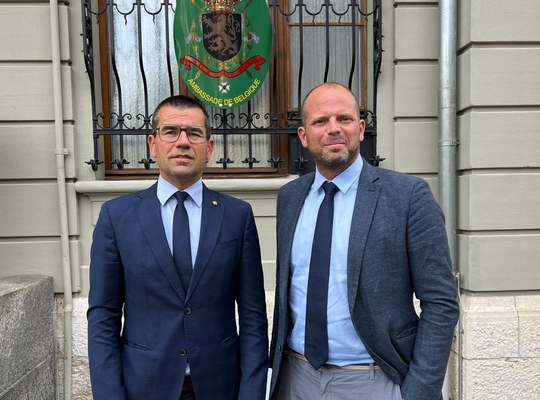You are here
Theo Francken and Sander Loones’ foreign visit: “Switzerland is showing the way out of the Belgian quagmire”

Belgium is in an institutional tangle, runs disastrous budget figures and can no longer be thoroughly reformed. Is that the case in all federal countries? MPs Theo Francken and Sander Loones went to Switzerland for a two-day study trip. “Why Switzerland? Here, governance starts from the municipalities and the regions, i.e. from the bottom up. And that’s how they get real results. Belgium is far too centralised, which is why we have become a zombie federation. Not dead, not alive, we just muddle along.”
The differences with Belgium are proportionate, says Loones: “The quality of the government is estimated to be five times higher in Switzerland than in our country. At the same time, the Swiss budget is on track towards balance, while Belgium continues to accumulate massive deficits of more than 5%. No wonder, because Switzerland has a debt brake. On the other hand, in the De Croo government, it’s all brakes off.” He also refers to the tax burden on people who work: “For the Swiss, it’s about 22%; in Belgium, it’s more than 50%. And government spending of about 56% in Belgium is also exploding, compared to about 32% in Switzerland. Switzerland proves that the model Belgium now has is failing.”
Belgium pulls everyone down
“The way Belgian federalism is put together today simply cannot work,” Francken adds. “In Switzerland, the system encourages the cantons to take responsibility, keep taxes lower and be competitive. Why is that not possible for us? Surely everyone can see that this Belgian model is not good for Wallonia either? Belgium pulls everyone down, while extensive competition can push up Flanders, Wallonia and Brussels alike.”
New institutional order
Belgian federalism is always negative: what will be split that we will no longer do together. “Switzerland proves that the opposite is much more effective. Give all the powers to the states and let them take responsibility to work together where that offers clear added value,” Francken and Loones conclude. “It is high time to put this country in such a new institutional order. Or are we all going to wait for Belgium to go bankrupt?”
Political and academic contacts
On their two-day study trip, at their own initiative and expense, the two MPs had political contacts (with Chancellor Walter Thurnherr, former and current secretaries-general Benedikt Würthe and Roland Mayer, and a visit to the Konferenz der Kantonsregierungen), academic consultations (Prof. Dr Pascal Sciarini, Dean at the University of Geneva; Prof. Dr Eva Maria Belser, Director of the Institute of Federalism, and international research expert Dr Sören Keil) and an extensive exchange of views on international security issues (Swiss Ministries of Defence and Foreign Affairs and various ambassadors).

